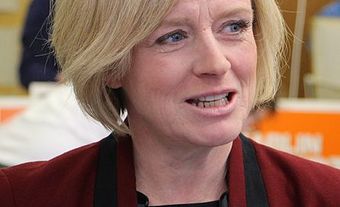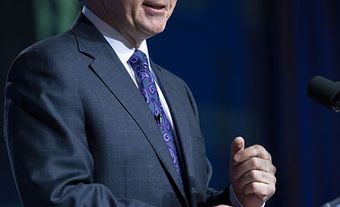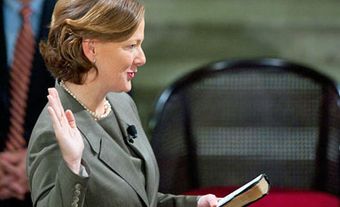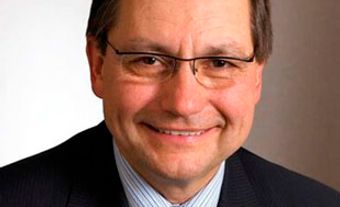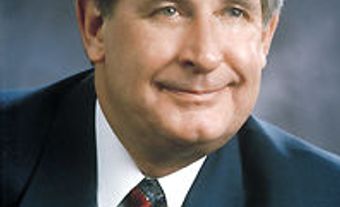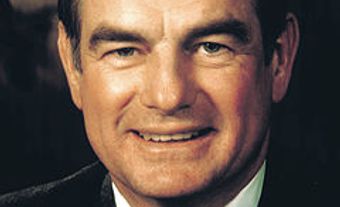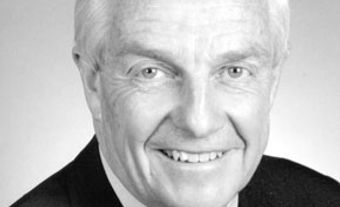Jason Kenney, politician, Member of Parliament (1997–2016), leader of the United Conservative Party of Alberta (2017–22), premier of Alberta (2019–22) (born 30 May 1968 in Oakville, ON). Jason Kenney was Member of Parliament for Calgary Southeast for nearly 20 years. He held several cabinet positions in the Conservative government of Prime Minister Stephen Harper, including Minister for Citizenship, Immigration and Multiculturalism; Minister of Employment and social development; and Minister of National Defence. Kenney resigned his seat in Parliament in 2016. In 2017, he was elected leader of Alberta’s United Conservative Party (UCP). It won a majority government in April 2019. Kenney stepped down as premier and UCP leader in May 2022 following a leadership review.

Early Life
Jason Kenney is one of three sons born to Lynne Kenney (née Tunbridge) and Robert Martin Kenney. Robert was a fighter pilot with the Royal Canadian Air Force. He later became a private school teacher and administrator. Jason’s grandfather is Mart Kenney, a famous big band leader. (See Mart Kenney and His Western Gentlemen). He once ran for the Liberal nomination in North Toronto.
Jason Kenney was born in Oakville, Ontario. The Kenney family then moved to Winnipeg, Manitoba. They moved again in 1976 to Wilcox, Saskatchewan, for his father’s work. Jason Kenney’s high school education was split between Athol Murray College of Notre Dame in Wilcox and St. Michaels University School in Victoria, British Columbia. He graduated from the latter in 1986.
Young Liberal
In his youth, Kenney was a member of the Young Liberals of Canada, the national youth wing of the Liberal Party of Canada. In 1986, he ran for election as vice-president of policy for the organization but lost. After graduating from high school, Kenney became an aide to Ralph Goodale. Goodale was leader of the Saskatchewan Liberal Party and the only Liberal member of the legislature.
Post-Secondary Studies
In 1987, Kenney began studies in philosophy at the St. Ignatius Institute at the University of San Francisco (USF). It was during this time that he was drawn to conservatism through reading the National Review, a conservative magazine.
Months into his degree, Kenney wrote an article in the campus newspaper that criticized American Catholics for ignoring church teachings. The next year, he led a charge to suspend the charter of the Women’s Law Student Association, which was collecting signatures for an abortion rights petition. In the winter of 1989, the university announced a new policy confirming the right to free speech. Kenney then organized a petition demanding the archbishop of San Francisco remove USF’s label as a Catholic institution. The archbishop refused. Kenney ultimately did not finish his degree in philosophy.

Taxpayers Federation
Jason Kenney’s activism at USF caught the attention of libertarian Kevin Avram, founder of the Association of Saskatchewan Taxpayers (AST). In 1990, the AST merged with the Resolution One Association of Alberta to form a national organization, the Canadian Taxpayers Federation (CTF). Avram chose Kenney to head the Alberta chapter of the CTF. In 1993, the 25-year-old Kenney became president of the organization. Two years later, he was featured on the cover of Maclean’s magazine as “The Tax Fighter.” By that time, the CTF had 83,000 supporters and held a lot of political influence.
Member of Parliament (MP)
Reform Party leader Preston Manning recognized Kenney’s potential and asked his campaign manager to approach Kenney about entering politics. In the 1997 federal election, Kenney ran as a Reform Party candidate. He easily won a seat as Member of Parliament (MP) for Calgary Southeast. He was appointed revenue critic and was soon co-chair of the party’s United Alternative campaign. It was created to explore potential mergers with the Progressive Conservatives. As negotiations progressed, Kenney informed Manning that he would be supporting Stockwell Day in his bid for leadership of the new Canadian Alliance.
Day became leader of the party in 2000. He was replaced by Stephen Harper in 2002. The following year, the Alliance and Progressive Conservatives merged to form a united Conservative Party. Kenney became an important voice for the social and religious conservatives in the party. He also helped bring Harper to power as party leader in 2006.
Parliamentary Appointments 2006–08
After the Conservative victory in the 2006 federal election, Jason Kenney was named parliamentary secretary. The following year, he became Secretary of State for Multiculturalism and Canadian Identity. (See also Multiculturalism; Canadian Identity.) In this position, he developed a strategy to expand the Conservative Party base by reaching out to immigrant voters from Africa and Asia. The impact of this strategy has been debated. In the 2011 election, the Conservative Party won several ridings it considered “very ethnic.” However, analysts found that on a national level, Kenney’s strategy had not resulted in a notable increase in ethnic support for the party. (See also Jason Kenney Appointed Multiculturalism Head.)
Minister of Citizenship, Immigration and Multiculturalism, 2008–13
In October 2008, Jason Kenney became Minister of Citizenship and Immigration. He retained responsibility for multiculturalism. Changes to the Citizenship Act in 2009 included the “first generation limitation.” This meant that children born outside of Canada would not automatically receive citizenship unless at least one of their parents had been born in Canada. Kenney also introduced a new citizenship guide, Discover Canada, in 2009. The guide required newcomers to have a broader range of knowledge about the country. It also denounced “barbaric cultural practices that tolerate spousal abuse, honour killings, female genital mutilation or other gender-based violence.” Critics noted that the guide did not include information about LGBTQ2 rights. (A sentence about it was included in the 2011 revision.)
Under Kenney’s leadership, the ministry made significant changes to the immigration system. These included limiting the number of skilled immigrant applications and removing a backlog of applications, refunding millions of dollars in application fees. Reforms to the Federal Skilled Worker Program mandated that applicants had to be qualified in one of 29 eligible occupations or have an offer of employment before immigrating to Canada. They also had to demonstrate a certain level of language proficiency.
Kenney took measures to prevent the abuse of the immigration system, focusing on human smugglers, fraudulent marriages and refugee claims. During his tenure, 115,000 refugees were resettled in Canada. However, privately sponsored refugees no longer received basic provincial health care benefits.
Kenney also sponsored the Protecting Canada’s Immigration System Act (2012). It aimed at keeping “bogus claimants out.” The Act drew a great deal of criticism from immigration and refugee lawyers and advocates. Under Kenney, the ministry investigated fraudulent citizenship claims. In 2012, Kenney announced that more than 3,000 Canadians were under investigation for fraud and would have their citizenship revoked. These numbers were later questioned.
Minister of Employment and Social Development, 2013–15
Jason Kenney became Minister of Employment and Social Development in a 2013 cabinet shuffle. He kept his position as Minister of Multiculturalism. As Minister of Employment, he focused on speeding up reviews of disability appeals for Canada Pension Plan and Old Age Security. He also negotiated an agreement with the provinces and territories (except Quebec) to implement the Canada Job Grant. It helps employers train new or existing employees.
Minister of Defence, 2015
After foreign affairs minister John Baird left politics, the Cabinet was shuffled again. Kenney became minister of national defence. He kept his role as Minister for Multiculturalism. As defence minister, Kenney stressed the danger of Islamic militants to Canadian security and promoted a hardline approach toward the Islamic State of Iraq and the Levant (ISIL). This included the authorization of airstrikes against Islamic State targets in Syria, a decision passed by Parliament in March 2015.
Kenney was criticized in March 2015 for tweeting photos that were allegedly of ISIS enslaving women. In fact, one of the images was staged by Kurdish protestors. Another was a photo from a ceremonial Shia Ashura procession celebrating the heroism of the prophet Muhammad’s grandson, Hussein, who was beheaded, and his sister, who was taken to Damascus in chains.
Provincial Politics
After the Conservatives were defeated in October 2015, Stephen Harper resigned as leader. Kenney, who was re-elected in his riding (renamed Calgary Midnapore), was considered a frontrunner for party leader. However, in 2016, he announced that he would seek the leadership of the Progressive Conservative Party in Alberta. He said that he wanted to unite the province’s centre-right parties.
Kenney resigned from the House of Commons in September 2016. He was elected leader of the Progressive Conservative Party of Alberta in March 2017. In July, the PCs merged with the Wildrose Party. In October, Kenney was elected leader of the new United Conservative Party (UCP) of Alberta.
In the 2019 provincial election campaign, Kenney and the UCP held a strong lead against NDP premier Rachel Notley. The UCP platform focused on shrinking the deficit through reduced spending and lower taxes, which it hoped would stimulate the economy. This included lowering the corporate tax rate from 12 to 8 per cent and eliminating the carbon tax. The NDP emphasized Kenney’s social conservatism, including his opposition to same-sex marriage. But most polled voters seemed to believe that Kenney and the UCP were most likely to get pipelines built and solve the province’s economic woes. Kenney retained this lead despite allegations of voter fraud during his 2017 leadership campaign. He also weathered the resignation or expulsion of several UCP campaign workers and candidates due to anti-Semitic, anti-immigrant and homophobic comments.
On 16 April 2019, Kenney led the UCP to a majority government in the Alberta general election. His UCP won 63 seats and 914,749 votes, while the NDP took 24 seats and 534,642 votes. Kenney was sworn in as premier of Alberta on 30 April 2019.
Premier of Alberta
Jason Kenney began his premiership with harsh criticism of the federal government’s climate change and energy policies. “We Canadians have been had,” he said on election night. “In Ottawa we have a federal government that has made a bad situation much worse.” Kenney also accused environmental groups of carrying out “a campaign of economic sabotage against the province.” He promised to reverse many of the NDP’s climate action policies.
Energy Policy
To defend the oil and gas industry, Kenney announced plans in June 2019 to create a so-called energy war room with a budget of $30 million. It would respond to what he considered misinformation spread by opponents of fossil fuel development. However, the Canadian Energy Centre (CEC) instead struggled through a series of public gaffes. These included claims that it misrepresented data related to Canada’s energy sector.
Frustrated with the slow speed of the Trans Mountain pipeline expansion project to bring oil to coastal British Columbia, Kenney threatened to hold a referendum on taking equalization payments out of the constitution. He claimed that Albertans had contributed more than $600 billion more to the rest of Canada than it had received back from the federal government over the previous six decades.
After Teck Resources Ltd. announced in February 2020 that it would cancel a proposed $20.6 billion oil sands project, Kenney blamed the federal government’s indecision over the approval process. He said he would use “every tool available” to give Alberta greater autonomy within Canada.
In early 2020, Kenney appeared poised to take a step toward government investment in the oil and gas industry, which faced slumping oil prices in the global market. In February 2020, he began to muse about the need for an “energy transition” away from fossil fuels over the coming decades. He said that Alberta could become a global leader in “greening non-renewable energy,” while also increasing its renewable forms of energy.
Budget Cuts and Employment Figures
Alberta's first budget under Kenney in 2019 brought deep cuts to social programs. Hundreds of public sector jobs were also eliminated. The corporate tax rate was cut from 12 to 8 per cent by 2022–23 — giving Alberta the lowest corporate tax rate in Canada. This was part of a strategy to lure investment, resurrect the oil and gas industry and stimulate employment.
However, by the end of 2019, more jobs had been lost in the province than under Rachel Notley’s NDP government. By early 2020, the unemployment rate among young men was almost 20 per cent. Kenney’s approval rating fell below 50 per cent for the first time since he became premier.
In its second budget, released in February 2020, Kenney’s government announced plans to cut $4 billion in spending over the next four years. This included a $400 million cut in post-secondary education and reduced drug benefits for seniors. The budget also forecast that the Alberta economy would return to full employment by 2023, falling from 7 per cent to prerecession levels of 5.1 per cent by 2023.
COVID-19 Pandemic
In mid-March 2020, the World Health Organization (WHO) declared COVID-19 a pandemic. The Canadian government closed its borders to reduce the spread of the disease. On 17 March, Alberta declared a state of health emergency. By the end of the month, there was a ban on social gatherings of more than 15 people and non-essential businesses were forced to close.
In July, Kenney announced that public schools would reopen in the fall without additional funding to reduce class sizes. This drew opposition from teachers and parents. By November, a second wave of the virus prompted the government to push classes for Grades 7 to 12 online. The following month, Alberta had the highest rate of COVID-19 infections in Canada. A full lockdown of social gatherings was implemented.
As case counts declined, restrictions on indoor dining and retail were eased in February 2021. With the COVID-19 vaccine rollout under way, Kenney suggested that major public events like the Calgary Stampede would return that summer. However, in April Kenney stalled plans to reopen due to a third wave of cases. Despite Alberta’s persistently high case count, many UCP members were frustrated by the continued restrictions. A group of 15 UCP members publicly criticized Kenney’s decision. In fact, Alberta had some of the most relaxed protocols in Canada. COVID-19 levels continued to rise until May. Then, the government closed indoor dining and moved all public school classes online.
By July 2021, roughly 70 per cent of Albertans had been vaccinated. With the green light from Alberta’s chief medical officer of health, Deena Hinshaw, Alberta became the first province to remove almost all official COVID-19 restrictions. Admission to indoor spaces would not be restricted by vaccine passports. Hinshaw further announced that masks would no longer be required on public transit. There would also be no mandated isolation period for anyone who tested positive for the virus. But through August, a fourth wave rapidly escalated. By the end of the month, Alberta had about three times more active cases per capita than the Canadian average.
In September 2021, Kenney came under fire from multiple sides. Hundreds of hospitalizations forced the postponement of surgeries. Soon, 12 mayors were calling for the imposition of vaccine passport rules. It was revealed that Hinshaw had based her overly optimistic expectations for the reopening on a small segment of data from Britain. The broader transnational data signalled much higher levels of risk. Critics argued she had acted under political pressure. The press also learned that Kenney had taken a two-week vacation in Europe the previous month, as COVID-19 numbers grew.
2021 Federal Election
The crisis in Alberta also had a significant impact on the campaign for the federal election on 20 September 2021. Earlier that month, Erin O’Toole and the Conservatives had taken the lead. They were polling at 35 per cent, compared to 32 per cent for Justin Trudeau’s Liberals. But the negative press around the dramatic spike in infections and hospitalizations in Alberta created a drag on the Conservatives in the final week of the campaign. O’Toole refused to even acknowledge that he had previously praised Alberta’s pandemic response.
The Conservatives went on to win the national popular vote by more than 186,000 votes but again lost to the Liberals. The Conservative share of the vote in Alberta fell by nearly 14 per cent compared to the previous election. O’Toole came under fire within the party for flip-flopping on key issues. But many laid the blame for the loss squarely on Kenney.
“Freedom Convoy” Protest and Coutts Blockade
Kenney’s public approval ratings began to decline rapidly after the 2021 election. Some high-profile members of the UCP called for his resignation. In late September 2021, Kenney proposed a review of his leadership in Spring 2022.
Meanwhile, on 29 January 2022, the border crossing into the United States at Coutts, Alberta, was blockaded as part of the “Freedom Convoy” protest in Ottawa against public health mandates. Kenney expressed support for the protest overall but said the blockade at Coutts — which sees about $44 million in trade per day — violated the Alberta Traffic Safety Act and must end. As the blockade dragged on, Kenney gave into protestor demands and rolled back many public health measures. These included the province’s vaccine passport program and a mask mandate in schools. The blockade was finally cleared on 15 February, after the RCMP seized a large cache of weapons and charged four men with conspiracy to commit murder.
Resignation
When Kenney’s leadership review finally took place, barely more than half of UCP members signalled their confidence in him. On 18 May 2022, Kenney announced his resignation as premier. “The result is not what I hoped for or frankly what I expected,” he said. “While 51 per cent of the vote passes the constitutional threshold of a majority, it clearly is not adequate support to continue on as leader.”
In October 2022, Kenney was succeeded as premier by former Wildrose Party leader Danielle Smith. At the time of his departure, Alberta was running a balanced budget for the first time in eight years, thanks largely to high oil prices. On 29 November 2022, Kenney announced his resignation as MLA for Calgary-Lougheed, effective immediately.
Career after Politics
On 1 February 2023, Kenney announced on Twitter that he was joining the public policy group at Calgary law firm Bennet Jones as a senior advisor. He added that he would not be involved in lobbying the government, and that his role with the firm had been approved by Alberta’s ethics commissioner.
(See also Jason Kenney Reinventing the Conservative Party.)

 Share on Facebook
Share on Facebook Share on X
Share on X Share by Email
Share by Email Share on Google Classroom
Share on Google Classroom
